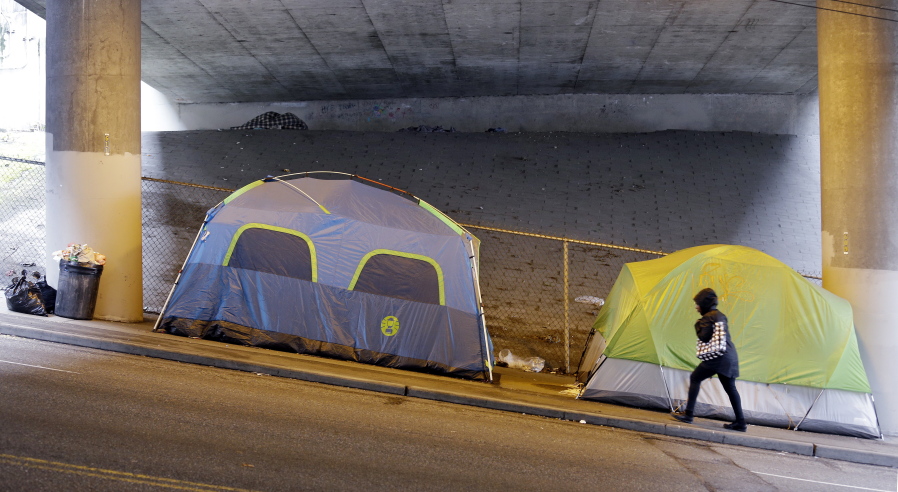An activist nonprofit group that manages Licton Springs, Seattle’s only tiny-house village that allows homeless residents to use alcohol and drugs onsite, is ending its role there, leaving control of the site to the city and another nonprofit.
The group known as SHARE/WHEEL, which for decades has defined a politically powerful and often controversial wing of homeless activism in Seattle, said it notified city officials Saturday that it will cease management of the Licton Springs tiny-house village off of Aurora Avenue in North Seattle by the morning of Oct. 22. That would end its tenure about five months before permanent closure of the site, which was announced by the city last month.
SHARE/WHEEL’s decision to leave Licton Springs escalates already heightened tensions between the organization and the city, stemming from their differences over how to best manage housing facilities for homeless people around Seattle. The city has criticized the group for not doing enough to move individuals into permanent housing, while the group accuses the city of not providing enough funding and personnel support for the communities it runs.
“We give this notice with heavy hearts, but out of necessity,” SHARE/WHEEL said in an emailed statement, which was also sent to the city. “We can only execute our operations safely and responsibly if we are given the power and respect to do so.”
Human Services Department officials announced late last month that they planned to close Licton Springs in March, when the site’s permit expired. Not enough village residents were moving into more permanent housing, the city said, although Licton’s exit rates often exceeded those of other villages. Seattle has launched an aggressive goal to move 7,400 homeless people into permanent housing by year’s end, more than double the target from 2017.
Licton Springs mainly drew controversy because its residents were allowed to use alcohol and drugs on site, behavior that was permitted based on a theory that many homeless people will not take shelter if they are first required to be substance-free. This, and the fact that many had been homeless for years, made them a particularly difficult population to house.
In an interview Saturday, Charles Johnson, a senior staffer for SHARE, defended his organization’s management practices. SHARE’s priority is not to get homeless people into housing, but to keep them stable and help them learn to trust others again, which is a long, slow process, he said.
As part of the city’s decision to close Licton Springs, it announced that Low Income Housing Institute (LIHI), an affordable-housing nonprofit that already provides financial support for Licton Springs and the city’s eight other tiny house villages, would take over all day-to-day village operations. The city also brought in an another organization, Lifelong, to help remaining camp residents find housing.
LIHI is “prepared to take over (the village) should SHARE not complete its operations agreement through the March timeline,” Seattle Human Services Department spokesperson Meg Olberding said in an email Saturday. There are still no plans to keep the village open beyond spring, she added.
Sharon Lee, LIHI executive director, said by phone Saturday that two new staffers will be hired to monitor Licton Springs. SHARE/WHEEL’s decision is positive because the group’s staff and leadership often got in the way of getting people housed, sometimes even “discouraging” them from moving,” she said.
In its letter to the city and LIHI, SHARE/WHEEL accused the two entities of fostering a “toxic power dynamic,” and criticized the city for failing to answer its concerns and questions, or provide adequate resources. In one instance, LIHI left the village without a case manager for three months, according to the letter.
When concerns were raised about possible misconduct by a case manager, those issues were ignored, it said.
SHARE stands for Seattle Housing and Resource Effort, while WHEEL, its partner organization, is the Women’s Housing, Equality and Enhancement League.
The combined entity is made up of current and formerly homeless individuals that has for years managed traditional, indoor homeless shelters throughout Seattle and tent cities.



